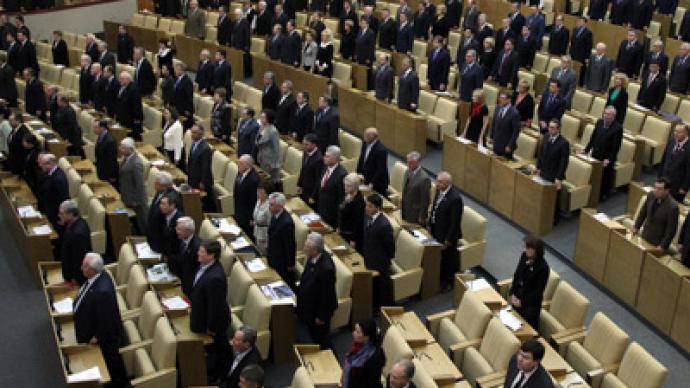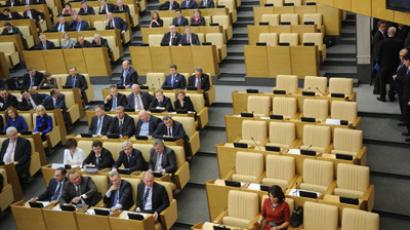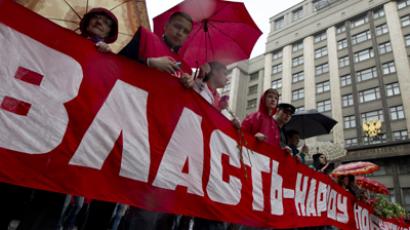Sunset marathon: Bureaucratic red tape fails to delay anti-rally bill

The opposition’s last-ditch attempt to delay a new law on fines for violating rally rules turned into a “pumpkin” at midnight. Though MPs filed hundreds of amendments to drag out the vote, the 11-hour marathon still culminated in the bill’s approval.
The proposed law provides for the highest-ever administrative fines for violators of rules regulating popular demonstrations. The penalty skyrocketed to 300,000 rubles (over $9,000) for individuals from the current 2,000 ($60). Despite the marathon legislative session, it was passed with 241 votes for and 147 against just ten minutes to midnight.“300,000 rubles in purse’s better than a hundred friends,” tweeted many angry Russians revamping an old proverb which says than a friend in court is better than a penny in the purse.The majority in the State Duma is held by United Russia, a pro-Kremlin party which is sponsoring the controversial bill, so chances to block the act were few and far between. But the bill’s adoption could get tied up in red tape, allowing the opposition to calmly go ahead with their demonstration scheduled for June 12, Russia Day.
‘Italian strike’ in Russian Duma
Opposition MPs, including the Communists and Fair Russia members, spent hours drawing up over 400 amendments to the projected law and brought them on Tuesday to the lower chamber of the Russian Parliament.The first package of 40 amendments took two hours to offer and reject, though the time to vote on every point was gradually slashed from three minutes to 15 seconds. As the first package was voted off, 400 more revisions followed – adding at least nine more hours to the marathon.Some amendments were obviously intended to prove a point, like an offer to tie the amount of fines not to strict figures, but to the average market cost of a police cap. Another revision demanded the new act include the line that “the bill, which violates the Constitution, was introduced by United Russia.”Four hours into the discussion, the meeting was getting as ridiculous as it was monotonous. The “Italian strike” promised by Fair Russia got in full swing, which meant everything was going “strictly by the rules,” however slow and inefficient this ultimately rendered the MPs’ work.The opposition made an effort to read out all the numbers and references, while their counterparts in the hall asked them to speak slowly as they were “transcribing.” After taking a break, orators also began quoting Human Rights conventions and demanding United Russia stop voting for absentees. The latter did not hinder the vote though despite previous reports to the contrary. By the third reading, only 141 MPs in total remained in the hall, which does not make up a quorum.The assembly (mostly United Russia members) was slowly boiling with anger. Before the meeting, Fair Russia warned that their “scrupulous” work could take up to 20 hours to complete."Why are you torturing us?” moaned Aleksey Mitrofanov from the Liberal Democrats.
‘Happy hour’?
As the bill was agonized over in the State Duma – or the Duma was simply in agony over the bill – over 70 of opposition activists protesting outside were detained by police, only to return later.“They must be contented, it is still happy hour,” a member of the United Russia tweeted upon hearing of the arrests.While the core team of the protest was spending their time at a police station, a young woman took a solitary effort to picket the House."Going to a demo – 300,000 rubles. Inviting people for a walk – 30,000 rubles. Living an honest life – priceless," reads her placard. The new law also provides fines for amassing people who have not officially announced a demonstration and a penalty for calls to protest.
‘Building civil society’
United Russia introduced the bill amidst non-abating public actions triggered by the results of the recent parliamentary and presidential elections in Russia. Many fear that the haste around the law is explained by authorities’ unwillingness to see any more civil actions, especially on Russia Day, hence the public outrage.But the party says opposition activists need stricter rules, as laughable fines give them a free hand to do almost whatever they want – however they want. The opposition rallies in Moscow on May 6 got out of control as several dozen people were injured, including protesters and riot police. “We are building a civil society,” said Vladimir Piligin of United Russia, who heads the working committee in charge of the rally bill."If you wish for civil society do you get prepared for civil war?” wondered Vladimir Gudkov, the most prolific author of the amendments filed by Fair Russia on Tuesday. “You want to render everyone guilty a priori – you are born here and it’s your fault. Poor luck with the motherland… Do you realize the consequences?”Gudkov says the anti-rally law is ambiguous to the extent that a dropped cigarette stub or broken tree branch may be penalized. And after two penalties, it will become increasingly difficult for a person to travel abroad or take up employment or studies requiring access to restricted files.Now the law, which took no time to pass through the Federation Council on Wednesday, is awaiting President Vladimir Putin’s consideration. The Presidential Human Rights Council has asked Putin to veto the law, as it violates the Constitution. A similar appeal was earlier rejected by United Russia working committee, who found no incongruity between the bill and the Constitution.














